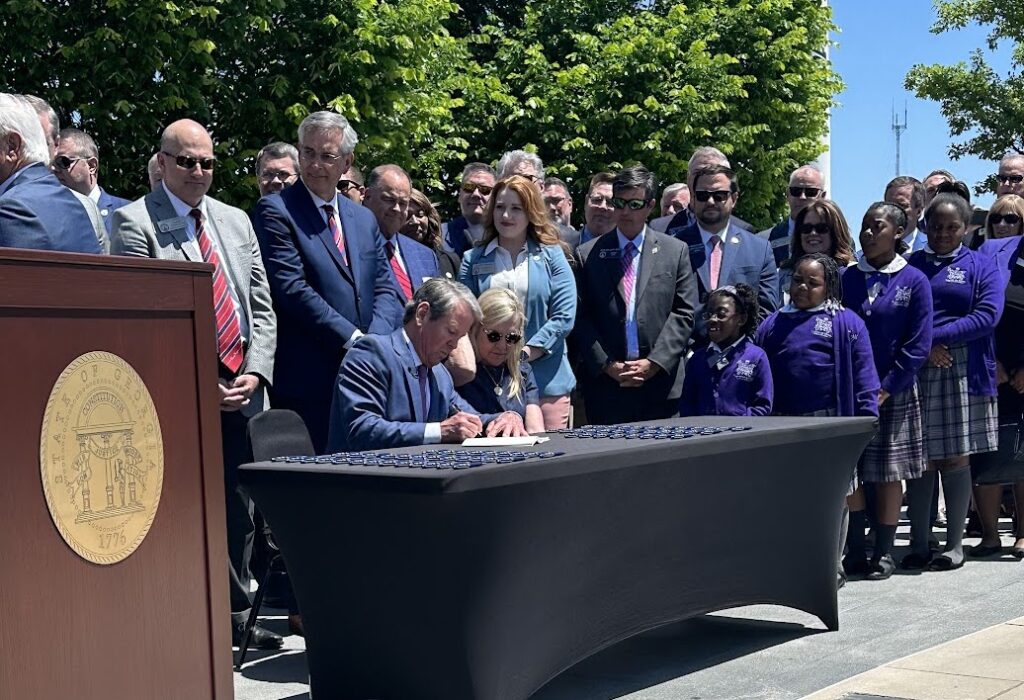Impact fees are one-time charges that local governments assess on new development to mitigate the impact of new growth on local public facilities. These fees must be proportionate to the impact imposed by new development on a given public facility and, once collected, must be spent in a manner that benefits fee payers reasonably.
In 1990, Georgia became one of the first states to enable impact fees, for uses including water, wastewater, stormwater, roads, parks and recreation, public safety and library facilities. Basic requirements include inventorying facilities and their existing levels of service, adopting a formal level of service, identifying deficient or excess capacity based on the adopted level of service, establishing service areas, projecting future facility needs for each service area based on the adopted level of service, and scheduling facility improvements to meet the needs of new growth and development.
While some states’ impact-fee laws favor local governments (such as California and Oregon) and others favor developers (such as Arizona and Texas), Georgia’s laws balance the interests of both.
Impact fees were long believed to be immune from attacks under the Takings Clause of the United States Constitution and corresponding clauses in state constitutions, including Georgia’s. But on April 12, the U.S. Supreme Court held otherwise. What does this mean for the future of impact fees in Georgia? We look at that in a new commentary from Arthur Nelson, one of the authors of Georgia’s initial impact-fee laws. We also have the latest news and analysis from the last week, including:
- Kemp signs Georgia Promise Scholarship Act
- U.S. Senate passes bill forcing TikTok’s parent company to sell or face ban
- Georgia officials break ground on UGA medical school building in Athens
- Biden administration brings back net neutrality
– Kyle Wingfield
Friday’s Freshest

Kemp signs Georgia Promise Scholarship Act
Georgia joins the growing number of states providing state-funded scholarships to families, allowing them the flexibility to choose non-public educational options that best meet their children’s unique learning needs. This is a legislative win for the Georgia Public Policy Foundation, which has played an active role in advocating for more extensive school choice legislation.
Georgians deserve more transparency, consistency and opportunity with open enrollment policies
On the surface, Georgia might appear in good shape when it comes to open enrollment: Families can request a transfer from one public school in their district to another, and in many cases they can pay a modest amount of tuition to enroll in another district. But looking deeper, we see many limitations on this important option – starting with transparency.
We aren’t building enough houses. Why?
Between 1995 and 2006 nearly 1.1 million new homes were built in Georgia. Between 2012 and 2023, only 625,000 were built. Why has this dropoff remained so stubborn?
The right way to end federal student loans
With the federal student loan program going off the rails, the time is right for a serious conversation about privatization. A sensible privatization agenda—combined with regulatory reform and better grant aid—would help ensure students come out ahead when they pursue college.
Clarke County Board of Education officials spent more than $300,000 of COVID-19 relief money on non-allowable expenses, according to an audit from the Georgia Department of Audits and Accounts. That story, and more, in our monthly review of waste, fraud and abuse in Georgia.
(Standalone section)
What is the Georgia Promise Scholarship?
The Georgia Promise Scholarship Act provides families with state-funded scholarships to be used toward an education of their choice. We provide helpful information on when the program will be available, who is eligible and how funds can be used.
The Latest
Economy
Georgia Ports CEO: We are preparing for growth
With more than $4.5 billion in infrastructure projects planned in port and intermodal infrastructure over the next decade, Georgia Ports is investing in projects to enhance what Georgia Ports President and CEO Griff Lynch described as the four key components to a successful port operation: Berth space, yard capacity, trucking gate fluidity and intermodal connectivity.
Rivian reaffirms commitment to Stanton Springs project
Weeks after it was announced that Rivian would be suspending construction in Stanton Springs, the electric vehicle company reaffirmed its commitment to the paused project. “Rivian remains appreciative of the efforts of the State of Georgia and the Joint Development Authority of Jasper County, Morgan County, Newton County, and Walton County and Rivian looks forward to its ongoing partnership and positive relationship with the Public Partners,” Rivian said in a letter to the state.
Another illegal power grab from the FTC
More than 30 million Americans have signed employment contracts that limit their ability to switch jobs to a competing company, and those contracts are regulated by laws in 47 states. The Federal Trade Commission swept all of that aside in one fell swoop this week, as the commission voted down party lines to ban future noncompete agreements and to block the enforcement of many of those existing contracts.
Education
Redistricting shuffles seats on state Board of Regents
The new congressional map the General Assembly drew during last fall’s special redistricting session is forcing Gov. Brian Kemp to shuffle several members of the University System of Georgia Board of Regents to other seats.
As Cherokee Charter closes, this school is looking to fill the gap
A new charter school could be opening in Cherokee County in August 2025, if it’s approved this year. Liberty Classical is looking throughout Cherokee for potential locations for a new charter school, including the current Cherokee Charter Academy location. Liberty currently has two charter schools in Georgia: the Atlanta-based Atlanta Classical Academy and the Kennesaw-based Northwest Classical Academy.
Floyd County School Board considers $300K robotic janitor purchase
The Floyd County school system is considering spending $300,000 to purchase eight robotic floor cleaners, four scrubbers and four sweepers, which would supplement the existing janitorial staff at the four county high schools. No janitorial staff would be laid off according to Superintendent Glenn White.
Government accountability
Kemp signs bill requiring kids to have parental permission to join social media
Georgia Gov. Brian Kemp signed a flurry of bills into law aimed at how the state’s children use social media and the internet. This week, Kemp signed Senate Bill 351, which requires children younger than 16 to have their parents’ explicit permission to create social media accounts. Companies would be required to verify users’ ages by July 1, 2025.
No more loitering at Atlanta’s airport
New security rules at Hartsfield-Jackson Atlanta International Airport have moved past the grace period into enforcement. The new policy places a 24-7 restriction on those who can be on the property. The airport, which continues to hold its title as the world’s busiest airport, wants it to also be the world’s safest airport.
Cityhood heats up in Gwinnett as hundreds attend town hall
Georgia House Majority Leader Chuck Efstration and state Sen. Clint Dixon, both Republicans, made their case for a large new city in northeastern Gwinnett before a crowd of hundreds at the Hamilton Mill United Methodist Church. The crowd, mostly friendly, occasionally applauded the legislators’ statements, but occasionally shouted out skeptical questions or voiced agreement with those who did.
Healthcare
Georgia officials break ground on UGA medical school building in Athens
Georgia officials broke ground on the University of Georgia’s new medical school building in Athens. Georgia taxpayers are chipping in $50 million in state funding for the facility, and private contributions will match the public dollars for the 92,000-square-foot, $100 million medical education and research building.
New Georgia law allows birthing centers to open without needing permission from nearby hospitals
When Katie Chubb tried to open a new birthing center in Augusta, Georgia, nearly three years ago, she hit an unexpected roadblock. The problem had nothing to do with the trained nurses and physicians that Chubb planned to employ at her Augusta Birth Center. It wasn’t that she couldn’t find potential patients. And it wasn’t — as is sometimes the case — that the state of Georgia said there was no “need” for her services.
Kemp signs measure to reform Georgia’s certificate of need law
Gov. Brian Kemp has signed a package of health-care bills, including the most significant reforms in decades to Georgia’s law governing hospital construction and new medical services. Most of the measures include provisions aimed at increasing access to quality medical care in rural Georgia, an issue gaining urgency as economic development efforts continue to pay off in job creation in rural communities.
Bonus

The Biden FCC brakes the internet with net neutrality
Remember when progressives said the Trump Administration’s rollback of net neutrality would break the internet? Federal Communications Commission Chair Jessica Rosenworcel now concedes this was wrong, yet she plans to reclaim political control over the internet anyway to stop a parade of new and highly doubtful horribles.
UNG Blue Ridge building to be named for David Ralston
A new University of North Georgia academic building that is currently under construction will be named the David E. Ralston Hall after approval for the naming was granted by the University System of Georgia’s Board of Regents this past week. The building is set to open in spring of 2025 and will house classes for the school’s College of Education and College of Health Science and Professions.
Congress passed a bill that could ban TikTok. Now comes the hard part.
A bill that would force a sale of TikTok by its Chinese owner, ByteDance — or ban it outright — was passed by the Senate on Tuesday and signed into law Wednesday by President Biden. Now the process is likely to get even more complicated.
Quotes of the Week
“Integrity without knowledge is weak and useless, and knowledge without integrity is dangerous and dreadful.” – Samuel Johnson
“It’s good to know who hates you, and it’s good to be hated by the right people.” – Johnny Cash
“There are many roads to success, but only one sure road to failure; and that is to try to please everyone else.” – Benjamin Franklin